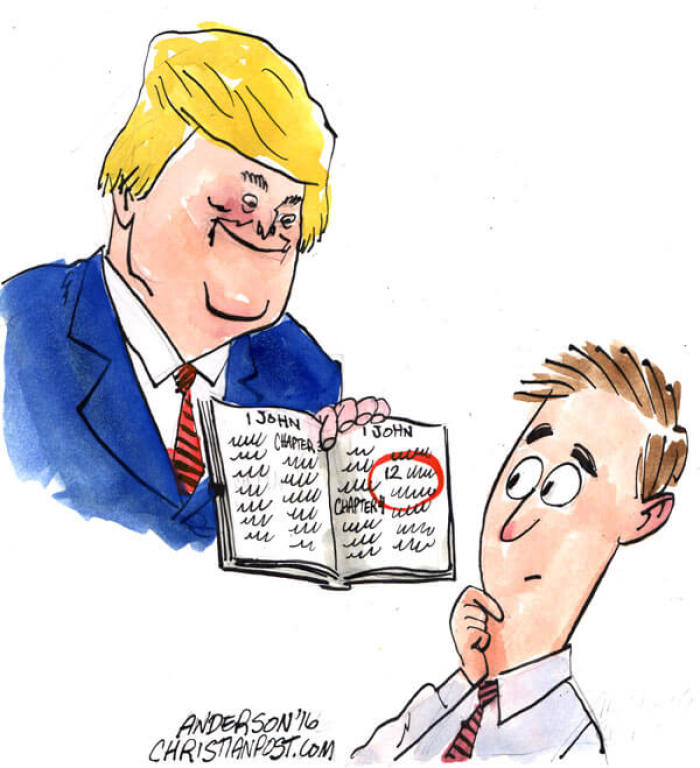Trump Evangelicals Choose Worldly Power Over the Gospel

The answer is a lust for worldly power: a temptation for the church since its beginning days. Jesus himself was taken to a high place and shown the "kingdoms of the world" by the devil and resisted the temptation to rule them. And he specifically warned against believing that his kingdom was of this world. His sacrifice on the cross was a conundrum and a challenge for his followers hopeful he would lead a rebellion against Rome to restore Israel's self-government.
But Trump has spoken to evangelicals in the only thuggish language he understands, and they have listened. He has explicitly offered them the prestige and clout they desire, if only they would follow him. Here is a good summary of the sordid bargain he offers:
"I'll tell you one thing: I get elected president, we're going to be saying 'Merry Christmas' again," he told a forum at Dordt College in Sioux Center, Iowa on Jan. 23. "Just remember that. And by the way, Christianity will have power, without having to form. Because if I'm there, you're going to have plenty of power. You don't need anybody else."
Consider the implication of that for a second. You don't need anybody else.
There is no more classic trap for the ambitious individual believer or the institutional church: the tendency to want earthly prizes for the sake of spreading the Word at some forever-postponed future date, as in the sad prayer of a struggling Christian actor or singer: Oh please, Lord, let me get this booking so that I might use my fame and riches to proclaim your glory. Oh God, can't you see this is a win-win for both of us? I promise to mention you in my acceptance speech!
Evangelicals have been seduced once again by the lure of power over the bigger love of the gospel.
The Missouri pastor and theologian Reinhold Neibuhr observed that Christianity "is more frequently a source of confusion than of light in the political realm."
He added: "The tendency to equate our political with our Christian convictions causes politics to generate idolatry."
There have been a few notable high-profile holdouts, Russell Moore among them, and a significant number of believers who are genuinely horrified by the prospect of the likes of the chief huckster of the Trump University scam holding the most exalted office in the nation — "the one-man distillation of the American people," in the memorable words of presidential historian Clinton Rossiter. But they are in the minority.
The dishonorable flirtation, if not outright embrace, of one of the most anti-gospel values candidates in recent memory is not only a scene out of Aguirre The Wrath of God in which a cowardly church is ready to ally itself with absolutely anybody with strong fists. It also raises the question about where evangelicals have squandered their moral voice and their future credibility; their Nathan-like ability to tell the king he is wrong and must repent. After the "character counts" reversal and the rush to paper over Trump's gleeful and unrepentant sins of the flesh, why would anyone want to listen to these guys ever again?
The words of Luke 16:10 seem appropriate here. "Whoever can be trusted with very little can also be trusted with much, and whoever is dishonest with very little will also be dishonest with much."
Trump-supporting evangelicals have pointedly turned away from their past insistence on the moral bona fides of a politician. They seem unwilling to face the truth about the woefully unprepared man to whom they would entrust the keys of the nation, let alone their own motivations for supporting him.
An unchurched observer would be within their rights to ask: If they have displayed such a lack of integrity on Donald Trump, how can we therefore trust evangelicals to tell us the truth about anything at all? This erosion of public confidence could be the most lasting impact of the Age of Trump upon the church.




























